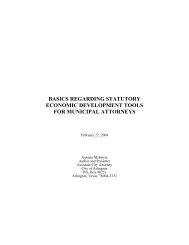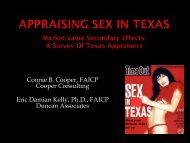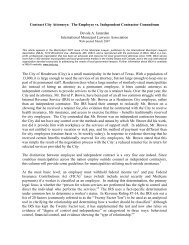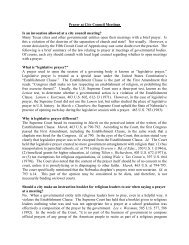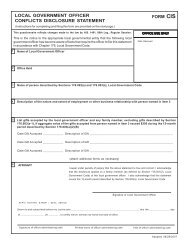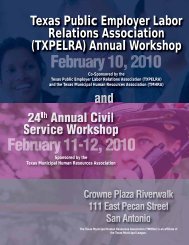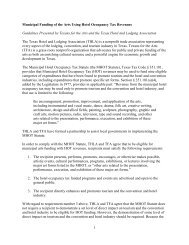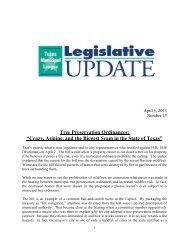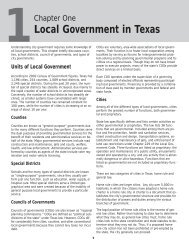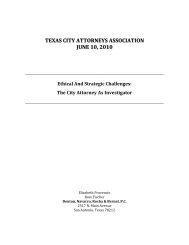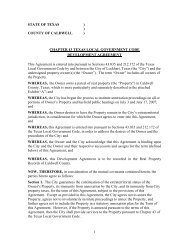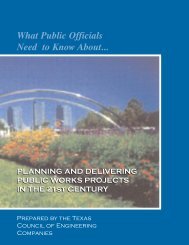Roles and Responsibilities of Officers In General Law Cities - Texas ...
Roles and Responsibilities of Officers In General Law Cities - Texas ...
Roles and Responsibilities of Officers In General Law Cities - Texas ...
Create successful ePaper yourself
Turn your PDF publications into a flip-book with our unique Google optimized e-Paper software.
( 7 ) Not have been deemed mentally incompetent by afinal judgment <strong>of</strong> a court.(Election Code Section 141.001; Local Government CodeSection 22.032 <strong>and</strong> 23.024).One additional requirement: If a Type A general law city hasbeen divided into wards, every council c<strong>and</strong>idate must, atthe time <strong>of</strong> his or her election, be a resident <strong>of</strong> the ward heor she proposes to represent if elected. (Local GovernmentCode Section 22.032).Terms <strong>of</strong> Office<strong>In</strong> a Type B general law city, the term <strong>of</strong> <strong>of</strong>fice for aldermenis one year, unless the board <strong>of</strong> aldermen has enacted an ordinanceproviding a two-year term for the mayor <strong>and</strong> twoyearoverlapping terms for aldermen (Local GovernmentCode Section 23.026). <strong>In</strong> a Type A general law city, theterm <strong>of</strong> <strong>of</strong>fice for members <strong>of</strong> the city council is two years(overlapping terms) (Local Government Code Section22.035).<strong>In</strong> any city, the term <strong>of</strong> <strong>of</strong>fice <strong>of</strong> members <strong>of</strong> the governingbody can be extended by ordinance to three years or fouryears upon approval <strong>of</strong> a majority <strong>of</strong> the voters voting at anelection called on the question (<strong>Texas</strong> Constitution, ArticleXI, Section 11).Vacancies<strong>In</strong> a Type B general law city operating under the aldermanicform <strong>of</strong> government, vacancies on the board <strong>of</strong> aldermen—whatever the number <strong>of</strong> vacancies—are always filled by appointmentby the remaining members <strong>of</strong> the board (LocalGovernment Code Section 23.002).<strong>In</strong> a Type A general law city operating under the aldermanicform <strong>of</strong> government, when there is only one vacancy on thegoverning body, the vacancy can be filled either by appointment<strong>of</strong> the city council or by means <strong>of</strong> a special election.However, if there are two or more vacancies on the governingbody, such vacancies must be filled at a special election(Local Government Code Section 22.010).<strong>In</strong> a city operating under the commission form <strong>of</strong> government(a Type C city), a single vacancy must be filled by appointmentby the two remaining members <strong>of</strong> the board <strong>of</strong>commissioners. But if there are two vacancies on the board,they must be filled at a special election called by the countyjudge (Local Government Code Section 24.026).AbsencesUnder Sections 22.038 <strong>and</strong> 22.041 <strong>of</strong> the Local GovernmentCode, an illness <strong>of</strong> an alderman or someone in his orher family is the only reason for absence from council meetingsin a Type A general law city. Unexcused absences arepunishable by a fine <strong>of</strong> $3 for each council meeting missed.If an alderman is absent for three consecutive regular meetings—unlessbecause <strong>of</strong> sickness or without first having obtaineda leave <strong>of</strong> absence at a regular meeting—his or her<strong>of</strong>fice shall be vacant.There is no law applicable to absences by aldermen in TypeB cities or members <strong>of</strong> the board <strong>of</strong> commissioners in municipalitiesoperating under the commission form <strong>of</strong> government(Type C cities). However, in cities over 500population, which operate under the commission form <strong>of</strong>government, Section 51.051 <strong>of</strong> the Local Government Code(relating to the application <strong>of</strong> laws to cities with the commissionform) would probably make Sections 22.038 <strong>and</strong>22.041 <strong>of</strong> the Local Government Code (relating to absences)applicable to such cities. Type B cities should contacttheir local legal counsel or the TML Legal Departmentto discuss this issue, as state law is unclear.RemovalProcedures for removing a councilmember from <strong>of</strong>fice in ageneral law city are the same as for the mayor.Compensation<strong>In</strong> cities operating under the commission form <strong>of</strong> government,the board <strong>of</strong> commissioners may, by ordinance, fixcommissioners’ compensation at a maximum <strong>of</strong> $5 for eachregular commission meeting <strong>and</strong> $3 for each special meeting.Alternatively, the board <strong>of</strong> commissioners in a city <strong>of</strong>2,000 or greater population can provide for paying commissionersup to $600 per year (Local Government Code Section141.003).<strong>In</strong> Type A <strong>and</strong> B general law cities operating under the aldermanicform <strong>of</strong> government, no maximum salary amountis fixed for aldermen. Therefore, the governing body can setcouncilmembers’ compensation at any level it decides. Onlyone limitation exists: An alderman cannot receive the benefit<strong>of</strong> a pay increase adopted during the term for which he orshe is elected. Such increase will become effective onlyafter the next general municipal election at which the <strong>of</strong>fice<strong>of</strong> the alderman serving at the time <strong>of</strong> the pay increase isfilled (Local Government Code Chapter 141).21



